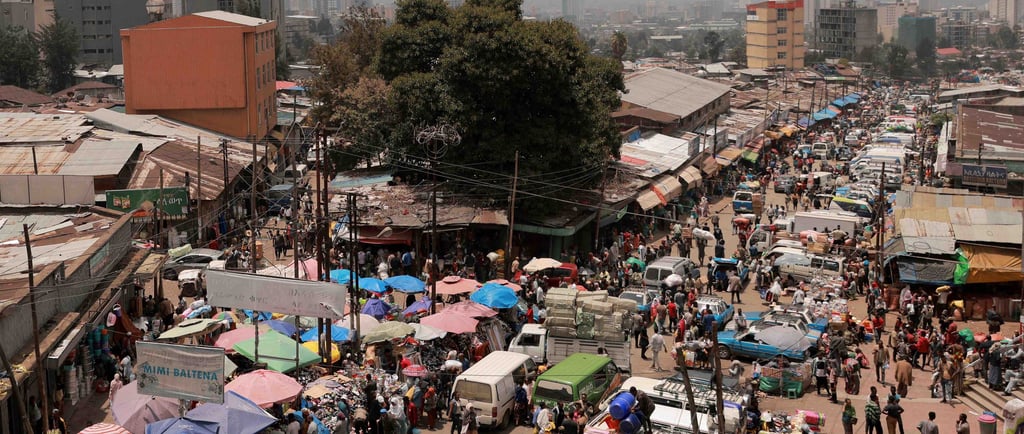The Investment Mirage: Why Rising FDI Isn't Saving Ethiopia's War-Torn Economy
Dr. Nourhan Abd El-Rahman, Lecturer of Economics, SVA
8/24/20253 min read


For years, Ethiopia was hailed as one of Africa’s great economic success stories—an "African Lion" with soaring growth rates and ambitious development plans. But since 2020, the nation has been gripped by a devastating cycle of internal conflicts that has not only created a massive humanitarian crisis but also brought its economic miracle to a screeching halt.
The Ethiopian government, eager to project an image of recovery, points to a recent uptick in Foreign Direct Investment (FDI) as a sign of resilience. But a closer look at the data reveals a far more troubling picture. While investment dollars may be returning, the country's economic fundamentals are weakening, its trade deficit is widening, and the benefits are not reaching the population.
This is the story of Ethiopia's investment mirage—a thin veil of positive numbers hiding a deeper economic crisis fueled by political instability.
A Nation at War with Itself
To understand Ethiopia's economic predicament, one must first grasp the depth of its political fragmentation. The country has been embroiled in a series of interconnected conflicts that have created a volatile and unpredictable environment, toxic to sustainable growth.
The Tigray War (2020–2022): A brutal conflict between the federal government and the Tigray People's Liberation Front (TPLF) left the northern region in ruins, caused widespread human rights atrocities, and drew international condemnation. A fragile peace agreement signed in 2022 has yet to resolve the underlying tensions.
The Amhara Conflict (2023–Present): Clashes erupted in the Amhara region between the Ethiopian army and local Fano militias, leading to a state of emergency and further destabilizing the country's delicate ethnic federalism.
Tensions with Somalia (2024): A controversial port deal signed between Ethiopia and the self-declared republic of Somaliland in January 2024 infuriated Somalia, which viewed it as a violation of its sovereignty. Prime Minister Abiy Ahmed’s framing of the deal as a necessary escape from a "geographical prison" has only inflamed regional tensions.
This relentless cycle of violence has created a staggering humanitarian crisis, with massive internal displacement and millions in need of aid. It has also created an environment where long-term economic planning is nearly impossible.
The Data Doesn't Lie: A Closer Look at the Numbers
On the surface, the government’s narrative of an FDI recovery seems plausible. After a sharp dip during the height of the Tigray War, investment has begun to rebound.
This recent uptick to $4 billion is a result of targeted economic reforms and investment promotion. However, this modest improvement is only half the story. To understand its true impact, we must look at how the country is performing in global trade.
As the data shows, after a strong performance in 2021 and 2022, Ethiopia's exports have collapsed. The political instability has crippled production and disrupted supply chains for key goods like coffee, oilseeds, and gold.
In stark contrast, imports have surged. With domestic industries paralyzed, Ethiopia has been forced to import more food, textiles, and fuel, reaching $14.6 billion in 2023—a massive increase from just $3.29 billion in 2017.
This growing trade deficit is a clear sign that the modest FDI recovery is not generating broad-based economic benefits. It is a drop in the bucket compared to the damage being done by the ongoing conflicts.
Conclusion: No Peace, No Prosperity
Ethiopia's future is shadowed by unresolved conflict. The state's failure to contain ethnic tensions and enact meaningful political reform threatens to create an even more complex and intractable crisis, potentially mirroring the situations in Somalia or Sudan.
Despite the government's efforts to attract foreign investment, the numbers paint a clear picture: the slight recovery in FDI has been completely overshadowed by a collapsing export sector and a ballooning trade deficit. The economic pain is real, and it is being felt by the population.
The conclusion is inescapable: without a durable political settlement, Ethiopia's economy will continue to deteriorate. Foreign direct investment is not a silver bullet. It cannot build a prosperous future on a foundation of political violence and instability. For Ethiopia, the path to economic recovery begins and ends with peace.
Download the full study here.
Empowerment
Amplifying African voices for sustainable progress together.
Contact US
Growth
Street No. 3281, N'Djamena, Republic of Chad.
© 2024. All rights reserved.